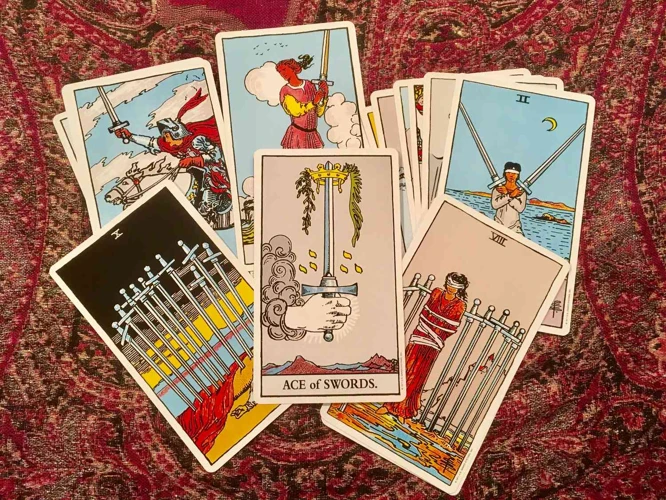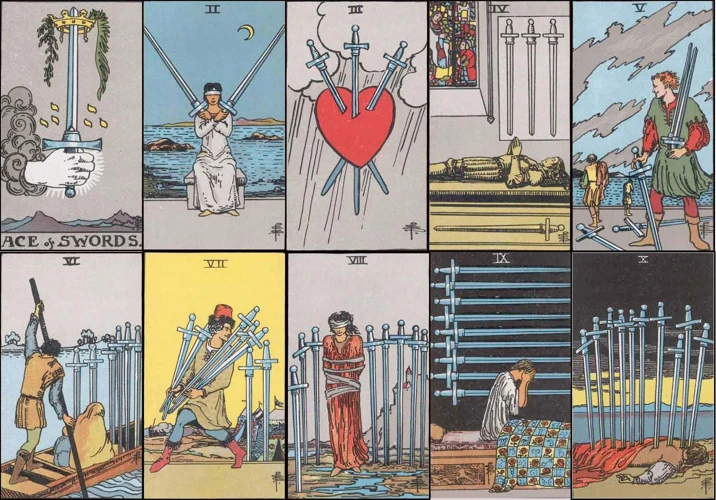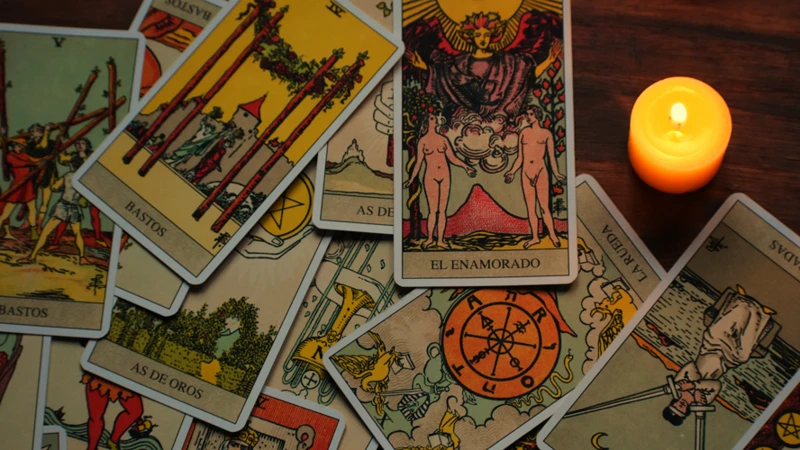Tarot cards have captivated and intrigued people for centuries, offering glimpses into the enigmatic world of divination. Among the four suits in the Tarot deck, the Suit of Swords stands out as a potent symbol of action, intellect, conflict, and decision-making. Each card in this suit presents unique imagery and symbolism, which we will decipher in this article. By understanding the deeper meanings behind the Suit of Swords, we can unlock the wisdom and insights it holds, unveiling a pathway towards self-discovery and personal growth. So, let’s embark on a journey to unravel the mysteries of the Suit of Swords and unveil the secrets it reveals.
Contents
- The Suit of Swords: Overview
- The Symbolism of the Suit of Swords
- Exploring Swords in Tarot
- Interpreting Sword Combinations
- Conclusion
-
Frequently Asked Questions
- 1. What does the Suit of Swords represent in Tarot?
- 2. How does the Suit of Swords relate to the element of Air?
- 3. What is the symbolism behind Swords as decision-making tools?
- 4. Why do Swords have a dual nature?
- 5. How does the Suit of Swords contribute to self-discovery and personal growth?
- 6. What is the significance of the Ace of Swords card?
- 7. What does the Knight of Swords represent in the Suit of Swords?
- 8. How does the Queen of Swords embody the qualities of the Suit of Swords?
- 9. What does the Ten of Swords card symbolize?
- 10. How can the Suit of Swords be interpreted in combination with other cards?
- References
The Suit of Swords: Overview

The Suit of Swords in Tarot represents the element of Air and embodies the qualities of intellect, communication, action, and conflict. It is associated with the mind, thoughts, and decision-making processes. The cards in this suit often depict individuals wielding swords, engaging in battles, or facing challenging situations. The Suit of Swords is characterized by its sharpness and directness, reflecting the swift and decisive nature of actions and conflicts.
Each card in the Suit of Swords holds its unique symbolism and meaning, contributing to the overall narrative of the suit. From the Ace to the King, every card in this suit represents different aspects of the human experience related to the realm of thoughts and actions.
The Suit of Swords is closely linked to the element of Air, which is associated with intelligence, logic, and analysis. Air represents the power of the mind, thoughts, and ideas. It signifies the ability to communicate, articulate, and express oneself effectively. The suit embodies the qualities of clarity, objectivity, and rationality, providing insight into the mental and intellectual aspects of life.
Swords also serve as decision-making tools in Tarot. They symbolize the need to exercise discernment and make choices based on logic and reason. The Suit of Swords urges individuals to think critically and weigh the pros and cons before reaching conclusions or taking action.
However, it’s important to note that Swords have a dual nature. While they possess the power to bring clarity and resolution, they can also cut through with sharpness, causing pain and conflict. This duality reminds us that every action has consequences, and the choices we make can impact ourselves and those around us. The Suit of Swords encourages individuals to handle conflicts and challenges with diplomacy and fairness, promoting growth and understanding.
The Suit of Swords in Tarot holds immense significance and symbolism. Representing the element of Air and emphasizing mental and intellectual energy, this suit offers insights into decision-making, action, and conflict. By understanding the distinct symbolism of each card in the suit, we gain a deeper understanding of ourselves, our choices, and the challenges we face in life.
The Symbolism of the Suit of Swords

The Suit of Swords in Tarot is rich in symbolism, representing a variety of significant themes and concepts. Here are some key aspects of the symbolism of the Suit of Swords:
1. Swords as Action and Conflict: The swords in this suit are often portrayed as tools of action, representing the need for decisive choices and the willingness to confront conflicts head-on. They symbolize the courage and strength required to overcome obstacles and challenges.
2. The Element of Air: Associated with the suit, the element of Air represents intellect, communication, and mental prowess. It reflects the power of thoughts, ideas, and the ability to analyze situations critically. Air encourages clear and logical thinking, emphasizing the importance of communication and expression.
3. Mental and Intellectual Energy: The Suit of Swords delves into the realms of the mind and intellect. It highlights the power of reasoning, analytical thinking, and mental agility. These qualities are essential for making informed decisions, solving problems, and gaining deeper insights into ourselves and the world around us.
4. Swords as Decision-Making Tools: Swords serve as tools for decision-making within the Tarot. They remind us to consider our options carefully, think objectively, and weigh the consequences before taking action. The Suit of Swords encourages us to trust our intellect and intuition when making important choices.
5. Dual Nature of Swords: Swords possess a dual nature, representing both constructive and destructive forces. They can bring clarity and resolution, but they can also cause pain and conflict. Understanding this duality is crucial for handling conflicts with fairness and diplomacy.
By exploring the symbolism of the Suit of Swords, we gain a deeper understanding of its themes and messages within the Tarot. These symbols guide us on a journey of self-reflection, encouraging us to embrace the power of the mind, make thoughtful decisions, and navigate conflicts with grace and wisdom.
1. Swords as Action and Conflict
Swords in the Tarot deck are powerful symbols of action and conflict. They represent the dynamic energy that propels us to take decisive steps toward our goals and ambitions. Just as a sword is used to assert control and defend oneself, the Suit of Swords signifies the need to assert ourselves and confront any challenges or obstacles that come our way.
In Tarot readings, when Swords cards appear, they often indicate situations that require swift action and assertiveness. It may suggest that there is a need to stand up for oneself or make decisions that may involve conflicts or confrontations. The Suit of Swords reminds us that in order to achieve our goals, we must be ready to face and overcome any obstacles or opposition.
The imagery on the Swords cards further reinforces their association with action and conflict. The cards often depict individuals holding or brandishing swords, engaged in battles or duels. These scenes symbolize the courage and strength required to face conflicts head-on. Additionally, the presence of clouds or stormy skies in some cards suggests the challenging nature of the situations at hand.
It’s important to note that while the Suit of Swords may indicate conflict, it doesn’t necessarily imply negative outcomes. Conflict can be a catalyst for growth and change, leading to resolution and progress. The cards in this suit call for us to embrace the energy of action and conflict, using it as a tool for personal development and achieving our desires.
To further explore the intricacies of the Suit of Swords, it’s helpful to examine individual cards within this suit. Each card offers unique insights into the specific aspects of action and conflict. For example, the Ace of Swords represents new beginnings and the potential for victory, while the Five of Swords signifies challenges and the need to choose battles wisely.
By delving into the symbolism of the Suit of Swords and its individual cards, we can gain a deeper understanding of how to navigate through conflicts, assert ourselves, and take action in our lives. This suit serves as a reminder that sometimes, in order to reach our goals and manifest our desires, we must face challenges and confrontations with determination and strength. Through the Suit of Swords, the Tarot guides us on a journey of self-empowerment and growth.
2. The Element of Air
The Suit of Swords is closely associated with the element of Air, which infuses it with the qualities of intellect, communication, and ideas. Air is often depicted as a swirling gust, an invisible force that carries sound and scatters clouds. It represents the realm of the mind, the power of thoughts, and the ability to articulate and express oneself effectively.
Just as air flows freely and effortlessly, the element of Air in the Suit of Swords represents the fluidity and flexibility of the mind. It symbolizes the power of reason, logic, and analysis. Air encourages us to think critically, to engage in intellectual pursuits, and to seek knowledge and understanding. In the context of the Tarot, the Suit of Swords represents the mental and intellectual energy we harness to navigate our lives and make decisions.
The element of Air also signifies communication and the exchange of ideas. It highlights the importance of clear and effective communication in our relationships and interactions. Air encourages us to find the right words to express our thoughts and feelings, to engage in meaningful conversations, and to listen actively to others. It is through the power of Air that we connect, share ideas, and seek resolutions to conflicts.
In the Tarot deck, the Suit of Swords embodies the qualities of Air, constantly reminding us of the significance of our thoughts and words. It serves as a reminder to be mindful of our communication, to engage in unbiased and open-minded thinking, and to seek clarity and understanding in our interactions.
The association of the Suit of Swords with the element of Air also points to the need for objectivity and detachment. It encourages us to think rationally and objectively, to approach situations without preconceived notions or bias. Air reminds us to consider different perspectives, to weigh the pros and cons, and to use our intellect to make sound decisions.
The element of Air in the Suit of Swords brings a sense of intellectual curiosity, mental agility, and effective communication. It urges us to embrace the power of our thoughts, words, and ideas, recognizing their impact on ourselves and the world around us. Through the symbolism of Air, the Suit of Swords illuminates the importance of intellectual pursuits and mindful communication in our personal development and interactions with others. The Magician card in Tarot can further deepen our understanding of the power and significance of the element of Air.
3. Mental and Intellectual Energy
Mental and intellectual energy is a prominent theme within the Suit of Swords in Tarot. Swords cards are known for their association with the element of Air, which represents intelligence, logic, and communication. This suit delves into the realm of thoughts, ideas, and the power of the mind.
In the context of the Suit of Swords, mental and intellectual energy is depicted through various symbols and imagery. The swords themselves symbolize the sharpness of intellect and the ability to cut through confusion and illusion. They represent analytical thinking, clear communication, and the pursuit of knowledge.
The cards within this suit often feature individuals engaged in intellectual pursuits or deep in thought, highlighting the importance of mental acuity and intelligence. The imagery may portray people strategizing, planning, or engaging in debates and discussions. These visuals emphasize the significance of critical thinking and intellectual prowess in navigating life’s challenges.
The Suit of Swords invites individuals to examine their thoughts and beliefs. It encourages introspection and self-reflection, urging individuals to question their assumptions and biases. By doing so, one can expand their intellectual horizons and gain deeper insights into themselves and the world around them.
The mental and intellectual energy depicted in the Suit of Swords reminds us of the power of words and communication. Effective communication is vital in conveying thoughts and ideas clearly, fostering understanding and connection with others. It also emphasizes the need for diplomacy and tact when engaging in discussions or resolving conflicts.
The mental and intellectual energy within the Suit of Swords serves as a reminder to approach situations with an open mind and a willingness to learn. It encourages individuals to rely on their intellect and reason, seeking logical solutions and making informed decisions. By embracing this energy, we can harness our mental capabilities to navigate challenges and achieve clarity in our lives.
Understanding the significance of mental and intellectual energy within the Suit of Swords provides valuable insights into the power of the mind and the role it plays in shaping our experiences. By delving into this aspect of the Tarot, we can gain a deeper understanding of ourselves and the world, enhancing our capacity for personal growth and intellectual development.
4. Swords as Decision-Making Tools
Swords in the Tarot deck serve as powerful decision-making tools, representing the need for discernment and clarity in our choices. Each card in the Suit of Swords offers unique insights into the decision-making process and its consequences.
One key aspect of Swords as decision-making tools is their association with logic and reason. The sharpness and precision of the swords symbolize the importance of thinking critically and objectively when faced with decisions. Whether it’s weighing the pros and cons, analyzing options, or considering long-term consequences, Swords remind us to approach decision-making with a clear and rational mindset.
In the realm of decision-making, the Suit of Swords encourages individuals to rely on their intellectual faculties rather than emotions. Emotions can sometimes cloud judgment and lead to impulsive or irrational choices. Swords represent the need to detach oneself from the emotional aspects and view the situation objectively, considering facts, data, and logical reasoning.
The Suit of Swords also emphasizes the concept of cause and effect. Every decision we make has consequences, and Swords urge us to be mindful of the ripple effects our choices can create. It reminds us to consider how our decisions may impact ourselves and others involved. By understanding the potential outcomes and repercussions, we can navigate decision-making with greater awareness and responsibility.
Swords as decision-making tools remind us to consider the ethical and moral implications of our choices. The suit emphasizes fairness, justice, and integrity. When faced with decisions, we are encouraged to align our choices with our values and principles. Swords guide us to make decisions that are not only logical but also morally upright and in harmony with our authentic selves.
By utilizing Swords as decision-making tools, we can harness their symbolic power to make informed choices and navigate the complexities of life. These cards offer guidance on how to approach decision-making with clarity, rationality, and a consideration for the greater good. With Swords as allies, we can cut through confusion and doubt, paving the way for wise and conscious decision-making.
5. Dual Nature of Swords
The Swords in Tarot possess a dual nature, symbolizing both the power to bring clarity and resolution, as well as the potential to cause pain and conflict. This duality is a reminder that every action has consequences, and the choices we make can impact ourselves and those around us. The sharpness of the Swords represents the swift and decisive nature of actions and conflicts. When used with wisdom and fairness, Swords can cut through illusions, reveal the truth, and provide clarity in challenging situations.
On one hand, the Swords represent the need for intellectual honesty and objectivity. They encourage us to think critically, analyze situations, and make decisions based on logic and reason. The Swords remind us that sometimes we need to detach ourselves emotionally from a situation to gain a clearer understanding. This objectivity allows us to navigate through complex issues and challenges with a rational mindset.
However, the Swords also serve as a cautionary symbol. When wielded without thought or compassion, they can create conflicts, hurt others, and cause emotional pain. The sharpness of the Swords can represent harsh words, arguments, or situations where actions may have unintended consequences. It is vital to consider the impact of our actions and words, ensuring that we communicate with empathy and seek resolutions that are fair and just.
The dual nature of Swords teaches us that it’s essential to find balance when dealing with conflicts and challenges. By embracing the positive aspects of the Swords, such as clarity and objective thinking, we can approach difficult situations with wisdom and fairness. It is crucial to remember that while the Swords can cut through illusions, they also hold the potential to wound. This understanding prompts us to exercise caution, empathy, and diplomacy when resolving conflicts, allowing us to promote growth and understanding in our interactions with others.
The dual nature of Swords is a powerful symbol in Tarot. It reminds us of the consequences of our actions and choices, urging us to find balance and use clarity and objectivity in our decision-making. The Swords invite us to harness their power wisely, promoting understanding and resolution in conflicts while minimizing harm and pain.
Exploring Swords in Tarot

In the world of Tarot, exploring the Suit of Swords offers a fascinating journey into the realm of action, conflict, and decision-making. Each card in this suit showcases a unique story and symbolism, unveiling deep insights into various aspects of human experiences. From the Ace of Swords, representing new beginnings and clarity of thought, to the King of Swords, embodying authority and intellectual power, the cards in the Suit of Swords provide a comprehensive exploration of the mind and the challenges one may face. Whether it’s the emotional turmoil depicted in the Three of Swords or the strategic planning of the Seven of Swords, each card holds its significance and contributes to the overall narrative of the suit. Unraveling the mysteries of the Swords in Tarot allows individuals to delve into their own thought processes, gain clarity, and navigate the complexities of life more effectively.
1. Ace of Swords
The Ace of Swords is a powerful card in the Suit of Swords that represents new beginnings and breakthroughs in the realm of thoughts and ideas. It is a card of clarity, decisive action, and intellectual prowess. When the Ace of Swords appears in a Tarot reading, it signifies an opportunity for a fresh start, where mental breakthroughs and innovative thinking can pave the way for success.
The Ace of Swords is often depicted as a single sword pointing upwards, surrounded by a crown or wreath. The sword represents the power of the mind and the ability to make clear and decisive decisions. It symbolizes truth, justice, and seeking the essence of reality. The crown or wreath signifies victory, achievement, and the recognition that comes with intellectual pursuits.
In a Tarot reading, the Ace of Swords encourages individuals to embrace intellectual challenges and seek out new ideas and perspectives. It is a reminder to trust in one’s mental abilities and intuition when facing difficult decisions. This card urges individuals to cut through confusion and gain clarity by examining situations objectively and setting aside biases or preconceived notions.
The Ace of Swords also invites individuals to communicate their thoughts and ideas with confidence and assertiveness. It encourages open and honest dialogue, emphasizing the importance of effective communication to bring about positive change. This card reminds individuals to express their opinions and beliefs while respecting the perspectives of others.
The Ace of Swords is a call to action, urging individuals to seize the opportunity for intellectual growth and progress. It signifies a time of mental strength and the potential for significant breakthroughs. When this card appears, it is a sign to embrace new ideas, forge ahead with determination, and use the power of the mind to overcome challenges.
The Ace of Swords in Tarot represents new beginnings, intellectual clarity, and the power of the mind. It offers the opportunity for fresh starts and breakthroughs in the realm of thoughts and ideas. By embodying the qualities of truth, justice, and effective communication, the Ace of Swords empowers individuals to make decisive decisions, seek mental clarity, and embrace intellectual growth.
2. Two of Swords
The Two of Swords is a card in the Suit of Swords that portrays a figure sitting with two crossed swords in front of them, creating a symbol of balance and decision-making. This card is often associated with difficult choices, dilemmas, and the need to find a middle ground. The symbolism of the Two of Swords revolves around the themes of indecision, blocked emotions, and the need for introspection.
The crossed swords in front of the figure represent the opposing options or viewpoints that need to be considered. The blindfold worn by the figure suggests that a decision cannot be made solely based on external factors, but requires inner reflection and intuition. It signifies the need to temporarily detach from the outside world and go within to find clarity and resolve.
The Two of Swords also reminds us of the importance of balancing our emotions and thoughts. It encourages us to find a harmonious equilibrium between our heart and mind when faced with conflicting choices. This card prompts us to take a step back and consider all perspectives, weighing the pros and cons before making a decision.
In a reading, the appearance of the Two of Swords often indicates a period of stagnation or reluctance to make a choice. It suggests that there may be a fear of making the wrong decision or being overwhelmed by conflicting emotions. However, it also serves as a gentle nudge to confront those fears and break free from the state of indecision.
In order to find clarity, the Two of Swords advises seeking solitude and introspection. By embarking on a journey of self-reflection, we can uncover our underlying beliefs, values, and desires, which will ultimately guide us towards making the right choice. It encourages us to trust our intuition and the inner wisdom that resides within us.
The Two of Swords serves as a reminder that decisions are a natural part of life, and it is through the process of making choices that we grow and evolve. This card urges us to confront our fears, embrace inner balance, and trust in our own ability to make decisions that align with our higher selves. Through careful consideration and self-reflection, we can navigate the complexities of life and find a path that leads to personal fulfillment and growth.
3. Three of Swords
The Three of Swords is a card in the Suit of Swords that holds profound symbolism and meaning. In traditional Tarot decks, it is often depicted as three swords piercing through a heart. This card represents heartbreak, emotional pain, and betrayal. It serves as a reminder that relationships and emotions can bring both joy and sorrow.
When the Three of Swords appears in a Tarot reading, it suggests that there may be a period of sadness or grief ahead. It could symbolize the end of a romantic relationship, a betrayal, or a loss that deeply affects the emotions. It signifies an emotional upheaval that may leave an individual feeling hurt and vulnerable. This card compels us to acknowledge and process our emotions, even if they are painful, so that we can move forward and find healing.
The Three of Swords also reminds us that heartbreak and emotional pain are an integral part of the human experience. It serves as a lesson in resilience and teaches us to navigate challenges with courage and strength. It encourages us to confront our emotions and seek support from loved ones or professional help when needed. Whether it’s through therapy, self-reflection, or time for self-care, the Three of Swords urges us to prioritize our emotional well-being.
In a Tarot reading, the Three of Swords can also signify the need for forgiveness and letting go. It prompts us to release any feelings of resentment or bitterness that may be holding us back. By embracing forgiveness, we can open ourselves up to healing and invite more positive energies into our lives.
The Three of Swords is a card that represents emotional pain and heartbreak. It reminds us of the complexities of relationships and emotions, and the importance of acknowledging and processing our pain in order to find healing and growth. While it may be a difficult card to face, it encourages us to have faith in our ability to overcome challenges and find inner strength.
4. Four of Swords
The Four of Swords in Tarot is a card that represents rest, retreat, and recuperation. It depicts a figure lying on a tomb-like structure, with their hands in a prayer position. This card signifies a period of deep introspection, meditation, and healing. It suggests the need to take a break from the demands and stresses of life in order to recharge and rejuvenate both mentally and physically.
The Four of Swords often appears when there is a need for a time-out or a temporary withdrawal from the outside world. It indicates a period of solitude and reflection, where one can find solace and inner peace. This card serves as a reminder to prioritize self-care and self-nurturing, allowing oneself to heal from past wounds and regain strength.
In the upright position, the Four of Swords encourages the individual to create a space for relaxation and restoration. It advises them to find a balance between their responsibilities and their well-being. This card may indicate the importance of taking a vacation, adopting a mindfulness practice, or seeking therapy to address any mental or emotional challenges.
When reversed, the Four of Swords suggests that the individual may be resisting the rest and recuperation that they truly need. They may be pushing themselves too hard or neglecting self-care. It serves as a gentle nudge to acknowledge the signs of burnout or stress and to take the necessary steps to prioritize their well-being.
The Four of Swords reminds us that taking time for ourselves is not a sign of weakness or laziness, but rather an essential part of maintaining a healthy and balanced life. It encourages us to listen to our bodies and minds, honoring the need for rest and rejuvenation. By doing so, we can emerge from this period of repose with renewed energy and clarity, ready to face the challenges that lie ahead.
For a deeper understanding of the Fool Card and its symbolism, you can explore its interpretation in Tarot.
5. Five of Swords
The Five of Swords in the Suit of Swords is a card that reflects conflict, deceit, and manipulation. In this card, we see a figure standing triumphantly while others appear defeated in the background. This card signifies a victory achieved at the expense of others, highlighting the theme of conflict and its consequences.
The central figure’s smug expression and the swords they hold suggest a sense of superiority and a willingness to win at any cost. However, the defeated figures in the background display expressions of sadness and defeat, indicating the negative impact of this victory. It serves as a reminder that not all wins are worth celebrating when they come at the expense of others’ well-being and happiness.
The Five of Swords cautions against unethical behavior, manipulation, and taking advantage of others for personal gain. It serves as a warning to reassess our actions and consider the potential harm caused by our choices. It prompts us to reflect on our values and whether our victories align with our principles.
In a tarot reading, the Five of Swords may symbolize a situation where conflicts have arisen due to selfish motives and a lack of consideration for others. It suggests the need for resolution and finding a more honorable and compassionate path forward. It may also serve as a reminder to choose our battles wisely and seek peaceful resolutions rather than engaging in destructive arguments. The Five of Swords compels us to examine our actions, ethics, and the impact we have on those around us.
The symbolism within the Five of Swords invites introspection and encourages us to strive for fair and just resolutions in our interactions with others. By understanding the meaning behind this card, we can gain deeper insights into the complexities of human nature and the importance of integrity in our actions.
To learn more about the significance of other tarot cards, you can explore the symbolism and interpretation of the Fool card. You can also delve into the meanings and insights offered by the other suits of the tarot deck, such as the Suit of Wands.
6. Six of Swords
The Six of Swords is a card in the Suit of Swords that carries significant symbolism and meaning. In this card, we see a figure seated in a boat, with six swords standing upright in the boat’s base. The boat is seen moving away from choppy waters towards calmer ones.
The Six of Swords represents a journey or transition from a difficult situation to a place of peace and stability. It signifies leaving behind turbulent times and moving towards a more positive and serene phase of life. The upright swords in the boat suggest that the challenges and conflicts faced in the past have been overcome and are now being left behind.
This card often represents a period of transition or a necessary retreat from a challenging circumstance. It indicates that the individual has made a conscious decision to move away from troubled waters towards a more peaceful and harmonious state. The Six of Swords encourages embracing change and leaving behind what no longer serves one’s well-being.
Symbolically, the figure in the boat can represent a guide or mentor who assists in navigating through the transition. It signifies seeking help, guidance, or support during times of change and difficulty. The calm waters in the distance symbolize a hopeful and brighter future on the horizon.
The Six of Swords also advises taking a practical and logical approach when facing challenges. It suggests that by analyzing situations objectively and making thoughtful decisions, one can overcome adversity and create a path towards a better future. It reminds individuals to trust in their ability to navigate through difficult times and adapt to change.
In readings, the Six of Swords may appear when there is a need for a fresh start or when one is in the process of healing and moving on from a painful experience. It can indicate a period of transition, a physical or emotional journey, or a relocation to a new environment. This card encourages individuals to embrace the opportunities that lie ahead and have faith in the positive outcome of their efforts.
The Six of Swords symbolizes moving away from difficult situations, embracing change, and transitioning towards a more peaceful phase in life. It reminds us of the importance of seeking support and guidance during times of transition and encourages us to trust in our ability to navigate through challenges.
7. Seven of Swords
The Seven of Swords is a card in the Suit of Swords that carries its unique symbolism and meaning. In this card, we see a figure cautiously carrying away five swords from a campsite, while two swords remain planted in the ground. The Seven of Swords often represents deception, stealth, and cunning actions.
The central theme of the Seven of Swords is sneakiness or dishonesty. It suggests that someone may be engaging in secretive or manipulative behavior, attempting to get away with something without being caught. This card can indicate a need for caution and vigilance, as there may be hidden agendas or deceitful intentions at play.
When the Seven of Swords appears in a reading, it serves as a reminder to trust our instincts and be discerning in our interactions and relationships. It suggests that there may be individuals around us who are not being entirely truthful or transparent. We are encouraged to stay alert and protect ourselves from potential harm or deception.
In some cases, the Seven of Swords can also indicate the need for strategic planning or thinking ahead. It may suggest that we should consider alternative approaches or think outside the box to overcome challenges or obstacles. This card reminds us to be resourceful and adaptable in our problem-solving.
The Seven of Swords serves as a warning to be cautious of dishonesty or secretive behavior, whether from others or ourselves. It encourages us to stay alert to protect our interests and maintain our integrity. By recognizing the symbolism of the Seven of Swords, we can navigate situations more wisely and make informed decisions based on truth and honesty.
8. Eight of Swords
The Eight of Swords is an intriguing card within the Suit of Swords in Tarot. In this card, we see a woman blindfolded and bound, surrounded by eight swords forming a kind of entrapment. The symbolism of this card represents feelings of restriction, limitation, and powerlessness. The woman’s blindfold suggests a lack of awareness or clarity regarding her situation, while her bound hands imply a sense of helplessness.
The Eight of Swords serves as a reminder that sometimes we create mental barriers for ourselves, holding us back from achieving our full potential. The swords surrounding the woman indicate self-imposed limitations, often stemming from fear, self-doubt, or negative thought patterns. This card urges us to examine our beliefs and perceptions, recognizing that many of the restrictions we face are within our own minds.
However, it’s important to note that the woman in the Eight of Swords is not completely trapped. The swords do not form a solid barrier, leaving gaps through which she could escape if she were to become aware of her surroundings. This indicates that the limitations we perceive are often more illusory than real. The Eight of Swords encourages us to challenge our self-imposed restrictions and find the courage to break free from limiting beliefs and negative patterns of thinking.
In readings, the Eight of Swords prompts us to examine the areas of our lives where we may be feeling trapped or limited. It encourages us to question the validity of these restrictions and consider alternative perspectives. This card invites us to take responsibility for our thoughts and actions, recognizing that we have the power to overcome our perceived limitations.
The Eight of Swords also serves as a reminder of the importance of seeking support and guidance from others. Sometimes, we may need an outside perspective to help us recognize the ways in which we are holding ourselves back. It reminds us that we are not alone in our challenges and that there is assistance available if we are willing to ask for it.
The Eight of Swords challenges us to confront our fears, break free from self-imposed limitations, and embrace the potential for growth and transformation. By acknowledging our power and taking steps to overcome obstacles, we can navigate through life with greater freedom and confidence.
9. Nine of Swords
The Nine of Swords is a card in the Suit of Swords that holds a heavy and somber energy. Depicted on the card is a figure sitting upright in bed, their head buried in their hands, conveying deep distress and anguish. This card symbolizes feelings of anxiety, worry, and despair, often associated with overthinking and excessive mental burden.
The Nine of Swords serves as a reminder that the mind can sometimes be our own worst enemy, tormenting us with negative thoughts and irrational fears. It indicates a state of inner turmoil and the weight of emotional pain. This card may appear in a reading when one is experiencing sleepless nights, nightmares, or recurring thoughts that are causing distress.
In terms of symbolism, the Nine of Swords highlights the power of the mind and its ability to create a prison of negative thoughts. The swords hanging on the wall behind the figure represent the challenging thoughts and worries that loom over them. However, it’s important to note that the swords are not piercing the figure, suggesting that these worries are self-imposed and can be overcome with the right mindset.
When this card appears in a reading, it serves as a call for self-reflection and confronting the fears and worries that have been holding you back. It encourages you to seek help and support from others, as sharing your concerns can alleviate the burden you carry. The Nine of Swords reminds us that we have the strength to overcome our anxieties and find inner peace.
In reverse, the Nine of Swords suggests that there may be a gradual release of anxiety and worries. It signifies the progress made in addressing your fears and seeking support. It represents a turning point where you begin to regain control over your thoughts and emotions.
The Nine of Swords is a card that signifies deep distress, anxiety, and worry. It reminds us of the power of the mind and the need to confront our fears to find inner peace. Through self-reflection, seeking support, and adopting a positive mindset, we can overcome these challenges and move towards a state of emotional well-being.
10. Ten of Swords
The Ten of Swords is a card in the Suit of Swords that carries a profound meaning and symbolism. This card presents a scene of a figure lying face down, with ten swords plunged into their back. It portrays a sense of overwhelm, defeat, and a culmination of challenges or conflicts. The Ten of Swords signifies the end of a difficult situation or a painful experience.
The symbolism of the Ten of Swords suggests that there may have been a betrayal, deception, or a significant loss in one’s life. It represents a breaking point, where one can no longer ignore or evade the issues at hand. The ten swords can be seen as a representation of the burdens, pain, and mental anguish that the individual has endured.
Despite the bleak imagery, there is a silver lining to the Ten of Swords. This card signifies a necessary and transformative ending, clearing the way for new beginnings and growth. It indicates that the individual has reached the limit of their endurance and is ready to release the pain and let go of what no longer serves them.
The Ten of Swords encourages individuals to acknowledge their feelings of defeat, pain, and vulnerability. By accepting the truth of the situation, healing and recovery can begin. It also serves as a reminder that even in the darkest moments, there is hope for renewal and a chance to rebuild.
In a Tarot reading, the Ten of Swords indicates that the worst is over, and it’s time to pick up the pieces and move forward. It encourages individuals to seek support from loved ones, therapists, or healers, as they navigate through the process of healing and transformation.
The Ten of Swords symbolizes the end of a challenging chapter and the potential for a fresh start. While the experience might be painful and overwhelming, it offers an opportunity for growth, resilience, and the restoration of one’s inner strength.
11. Page of Swords
The Page of Swords is the eleventh card in the Suit of Swords in Tarot. This card embodies the qualities of curiosity, intellect, and a thirst for knowledge. The Page of Swords is depicted as a young figure holding a sword with a vigilant and curious expression on their face.
Symbolism: The Page of Swords symbolizes the enthusiastic pursuit of knowledge and the willingness to explore new ideas and concepts. The sword they hold represents their intellectual ability and the power of their thoughts. The wind blowing through their hair suggests a sense of restlessness and the desire for new experiences.
Meaning: In a reading, the Page of Swords often represents a young or youthful energy. It signifies the beginning of intellectual growth, curiosity, and learning. It may indicate that the seeker is embarking on a new educational journey or is being encouraged to seek out new information and perspectives. The Page of Swords encourages the seeker to be open-minded, curious, and willing to challenge their current beliefs.
Reversed: When reversed, the Page of Swords can indicate intellectual restlessness or a tendency to become easily bored or distracted. It may suggest a lack of focus or difficulty in committing to long-term goals. The seeker may need to be mindful of impulsive decision-making and think more carefully before taking action.
Keywords: Curiosity, intellect, knowledge-seeking, restlessness, youthfulness.
The Page of Swords represents a youthful and curious energy that encourages the seeker to embrace intellectual growth and seek out new knowledge. It signifies a time of exploration and openness to new ideas, urging the seeker to approach life with a sense of curiosity and a willingness to learn.
12. Knight of Swords
The Knight of Swords is a dynamic and assertive card in the Tarot deck. This card depicts a gallant knight charging forward on his noble steed, sword raised high in his hand. It symbolizes the energy of swift action, courage, and ambition. When this card appears in a reading, it signifies a time of intense determination and a strong desire to pursue goals with fervor and determination.
The Knight of Swords represents a person or a situation that is characterized by their directness, assertiveness, and sometimes even impatience. They are not afraid to speak their mind and take bold actions to achieve their objectives. However, this assertiveness can also border on aggression or recklessness at times. It is important to keep in mind that while the Knight of Swords brings passion and zeal, it is crucial to temper this energy with thoughtfulness and consideration for others.
In terms of personality, the Knight of Swords embodies the qualities of being quick-thinking, intelligent, and logical. They are excellent problem solvers and have a knack for assessing situations with clarity. However, their approach may come across as blunt or confrontational, which can sometimes create tension in relationships or interactions.
When the Knight of Swords appears in a reading, it often signifies a period of rapid change or the need for immediate action. It may indicate that you are being called upon to courageously face challenges or make quick decisions. This card encourages you to embrace your assertiveness, assert your boundaries, and pursue your goals fearlessly. However, it is also a reminder to balance your assertiveness with compassion and consider the potential consequences of your actions.
The Knight of Swords is a card that symbolizes action, bravery, and assertiveness. It calls for you to tap into your inner strength and take decisive steps towards your goals. Embrace the energy of the Knight of Swords, but remember to exercise caution and approach situations with thoughtfulness and perspective.
13. Queen of Swords
The Queen of Swords in the Suit of Swords is a powerful and influential figure. She embodies the characteristics of intellect, independence, and wisdom. The Queen of Swords sits on her throne, holding a sword upright in one hand while her other hand points forward with determination. This card represents a woman who is sharp-minded, logical, and assertive.
The Queen of Swords encourages us to embrace our intellect and use it to navigate the challenges we face. She symbolizes the importance of clear thinking and objective decision-making. With her sharp wit and analytical abilities, she sees through illusions and gets to the heart of the matter. She is not one to be swayed by emotions or false pretenses.
Despite her independence and self-assured nature, the Queen of Swords also portrays compassion and fairness. She believes in justice and equality and expects others to follow the same principles. She values honesty and integrity in all aspects of life, and she encourages others to do the same.
When the Queen of Swords appears in a reading, she often signifies a need to embrace our own intellectual capabilities and make decisions with clarity and discernment. She reminds us to trust our inner wisdom and rely on our own judgment. This card encourages us to communicate our thoughts effectively and assertively, without being overly harsh or critical.
In relationships, the Queen of Swords can represent a person who is highly intelligent and seeks a partner who can match them intellectually. They value stimulating conversations and appreciate partners who can engage their intellect and challenge their ideas.
The Queen of Swords in the Tarot deck represents a woman of strength, intellect, and independence. She serves as a reminder to balance emotions with logic, to embrace our own wisdom, and to communicate our thoughts and ideas with confidence. When we embody the qualities of the Queen of Swords, we can navigate life’s challenges with clarity, fairness, and assertiveness.
14. King of Swords
The King of Swords in Tarot is a powerful and authoritative card within the Suit of Swords. Representing a mature and experienced individual, the King of Swords embodies intellect, rationality, and clarity of thought. This card symbolizes the mastery of the mind and the ability to make fair and just decisions.
The King of Swords sits on a throne, adorned with symbols of authority and power. He holds a sword upright in his hand, representing his analytical and logical mindset. His stern expression signifies his impartiality and objectivity in making judgments.
When the King of Swords appears in a reading, it suggests the presence of someone who possesses strong leadership qualities, intelligence, and a sharp wit. This individual may be knowledgeable in a particular field and relies on their mental acuity to navigate through challenges. They approach situations with reason and logic, making sound decisions based on fairness and justice.
The King of Swords encourages the seeker to embrace their intellectual side and engage in critical thinking. It reminds them to rely on their knowledge, experience, and insight to overcome obstacles and find solutions. This card advises the seeker to approach situations objectively and to consider all perspectives before making decisions.
The King of Swords also represents the need for clear communication and effective verbal expression. It encourages the seeker to speak their truth with confidence and assertiveness. This card suggests that by using words wisely, one can influence and inspire others.
In a relationship context, the King of Swords may indicate the presence of a partner who is logical, analytical, and intellectually stimulating. They value open and honest communication, and they expect their partner to meet them on an intellectual level.
The King of Swords signifies authority, intelligence, and fair judgment. Whether representing an individual or a situation, this card calls for rational thinking, effective communication, and unbiased decision-making. By embodying the qualities of the King of Swords, individuals can navigate challenges with confidence and achieve success through their mental prowess and wisdom.
Interpreting Sword Combinations
Interpreting sword combinations in Tarot adds another layer of complexity and depth to the reading. When multiple Sword cards appear together, they create a unique narrative and offer a more nuanced interpretation. Although each card carries its own symbolism and meaning, their combination further influences the overall message conveyed.
One way to interpret sword combinations is by considering the overall energy and themes present. For example, if cards like the Ace of Swords, Six of Swords, and Page of Swords appear together, the combination may indicate a breakthrough in mental clarity and the journey towards a more peaceful and balanced state. The Ace of Swords signifies a fresh start or a new perspective, while the Six of Swords represents moving away from difficulties and towards smoother waters. The Page of Swords adds an element of curiosity and intellectual growth.
Another approach to interpreting sword combinations is to look for patterns or narratives within the cards. Pay attention to the positions of the figures, the direction they are facing, and the symbols or elements depicted. These details can provide insight into the relationships and dynamics between the cards.
In interpreting sword combinations, it’s crucial to consider both the individual meanings and the collective impact. Each card contributes its own influence, but their combination may create a unique story or emphasis. For instance, if the Three of Swords (symbolizing heartbreak and sorrow) appears next to the Ten of Swords (symbolizing a painful ending or betrayal), the combination strongly indicates a significant emotional loss or betrayal.
Additionally, the presence of certain court cards in a sword combination can add a specific energy to the reading. The Queen of Swords, for example, brings forth qualities of intellect, objectivity, and fierce determination. The Knight of Swords represents swift action, assertiveness, and a single-minded pursuit of goals. Taking these court cards into account can provide valuable insights into the personalities or energies influencing the situation.
It’s important to remember that interpretation is subjective, and the specific context and question posed during a reading will influence the meaning of sword combinations. Trust your intuition and allow the imagery and symbolism of the cards to speak to you personally. By examining sword combinations with an open mind and considering the connections and narratives they create, you can unlock a deeper understanding of the messages and guidance Tarot has to offer.
Conclusion
In conclusion, the Suit of Swords in Tarot is a powerful symbol of action, conflict, intellect, and decision-making. Each card within this suit holds its own unique symbolism and meaning, providing insight into the various aspects of the human experience related to thoughts and actions. The Suit of Swords represents the element of Air, signifying intelligence, logic, and communication. It emphasizes the need for clear, objective thinking and encourages individuals to make thoughtful decisions based on rationality and reason. However, it’s important to remember that Swords have a dual nature, capable of both clarity and conflict. This duality serves as a reminder that every action carries consequences and highlights the importance of handling conflicts with fairness and diplomacy. By exploring and understanding the symbolism of the Suit of Swords, we can gain valuable insights into ourselves, our choices, and the challenges we face in life. Tarot offers a profound tool for self-discovery and personal growth, and the Suit of Swords serves as a guide on our journey towards understanding and enlightenment.
Frequently Asked Questions
1. What does the Suit of Swords represent in Tarot?
The Suit of Swords represents the element of Air and encompasses qualities such as intellect, communication, action, and conflict. It symbolizes the realm of thoughts, decision-making, and the swift nature of actions and conflicts.
2. How does the Suit of Swords relate to the element of Air?
The Suit of Swords is closely associated with the element of Air, which signifies intelligence, logic, and analysis. Air represents the power of the mind, thoughts, and ideas, emphasizing clarity, objectivity, and rationality.
3. What is the symbolism behind Swords as decision-making tools?
Swords serve as decision-making tools in Tarot, symbolizing the need for discernment and making choices based on logic and reason. The Suit of Swords encourages individuals to think critically and weigh the pros and cons before reaching conclusions or taking action.
4. Why do Swords have a dual nature?
Swords have a dual nature because they can bring both clarity and resolution, as well as pain and conflict. They remind us that our actions have consequences and that we need to handle conflicts and challenges with fairness, promoting growth and understanding.
5. How does the Suit of Swords contribute to self-discovery and personal growth?
The Suit of Swords offers insights into the mental and intellectual aspects of life, providing a pathway towards self-discovery and personal growth. By understanding the symbolism of each card in the suit, individuals gain deeper insights into their choices, challenges, and thought processes.
6. What is the significance of the Ace of Swords card?
The Ace of Swords represents new beginnings, intellectual clarity, and breakthroughs in thoughts and ideas. It signifies a fresh start in the realm of the mind and encourages individuals to embrace new perspectives and opportunities.
7. What does the Knight of Swords represent in the Suit of Swords?
The Knight of Swords is a card of action and swift movement. It represents a person who is driven, assertive, and confident in their pursuits. This card urges individuals to take bold steps and pursue their goals with determination.
8. How does the Queen of Swords embody the qualities of the Suit of Swords?
The Queen of Swords represents intelligence, discernment, and clear communication. She is known for her sharp wit and ability to analyze situations objectively. This card encourages individuals to think critically and express themselves with honesty and clarity.
9. What does the Ten of Swords card symbolize?
The Ten of Swords represents the end of a difficult chapter or situation. It signifies the completion of a cycle and the opportunity for new beginnings. While it may initially appear as a card of defeat, it also carries the potential for transformation and growth.
10. How can the Suit of Swords be interpreted in combination with other cards?
When the Suit of Swords is combined with other cards in a Tarot reading, it enhances and modifies their meanings. For example, Swords in combination with Cups may suggest a blend of emotions and thoughts, while Swords with Wands may represent the fusion of action and intellect. Interpreting these combinations allows for a richer and more nuanced understanding of the overall reading.






